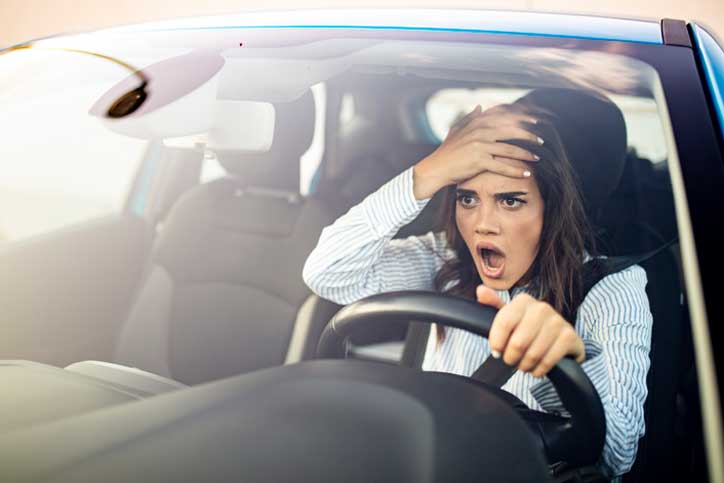Making a Driving Complaint to Police
Have you ever felt upset enough about something that happened around you in traffic that you wanted to report it to the police? I’m sure that we’ve all felt that way at one time or another but haven’t followed through because we didn’t know if it was worthwhile or if anything would happen to the offending driver if we did. Here is what you need to know in order to make an effective driving complaint to police.
Probably the single most important piece of information to gather is the license plate number of the offending vehicle. Write it down and keep the paper that you wrote it on to refer to later in court. At the very least, this is all that the police need to start an investigation with. Details of the who, what, where, when and why come next. The more you can recall and provide to the investigator the more likely that the investigation will result in charges against the offending driver. Like the license plate number, write these down at the first possible opportunity so that they will not be forgotten.
If the driving behaviour is serious and could result in immediate harm to others call 911 and make the report immediately. If this is not the case, a call to the police non-emergency number for the area the incident occurred in as soon as reasonably possible is sufficient. After you have provided the particulars of your case, ask for and record the file number of your complaint. All complaints are given a file number and this is what you will need if you follow up on your complaint at a later date.
There are three levels of involvement in a driving complaint. From least effective to most effective, they are:
- You report the incident as an anonymous complainant
- You report the incident, identify yourself, but decline to become involved any further.
- You report the incident, identify yourself and commit to attending court if necessary.
If you report as an anonymous complainant, all that the police can do is patrol the area of your complaint and react to something that they see the suspect vehicle do, if anything. This type of complaint is usually assigned a low priority.
If you identify yourself but decline a court appearance, the police can patrol for and try to intercept the vehicle as they would for an anonymous complaint. If it is found the driver can be advised of the complaint and cautioned about their driving. If the registered owner is not driving or the vehicle is not located, police may choose to send a cautionary letter to them advising how their vehicle was being used and leaving it up to them to deal with the driver.
If you identify yourself and commit to a court appearance if necessary, patrols will be made and an investigation started. You will be asked for a written statement of the details of the incident. This importance of this is twofold, the police have full details of the incident recorded and you have an accepted method of refreshing your memory for court purposes.
When I started an investigation like this, I would identify the registered owner of the offending vehicle and visit them personally. I would advise them that their vehicle had been involved in a breach of the Motor Vehicle Act and require them to identify the driver to me. Failing to do this is an offence, even if it is the registered owner who was driving at the time. I now had a driver I could deal with directly or I could charge the registered owner for the original offence and failing to identify the driver.
My next step was to speak with the driver. I would outline the complaint to them, advise them that they did not have to say anything in response, but if they chose to explain I would listen and possibly choose to use the explanation in court if it came to that point. At this point in the investigation, I now had to decide on the success of a prosecution if I charged the offending driver. If there was a substantial possibility of conviction I would charge (usually by way of a violation ticket). If not, I would caution the driver if it was appropriate.
In either case, I would then call the complainant back and tell them what had occurred.
If the offending driver was charged it did not always result in a dispute and court appearance for the complainant. These incidents usually involved driving behaviour that was significantly out of the ordinary and many of the tickets were paid or ignored and subsequently deemed convicted when 30 days had passed from the date of issue.
When the ticket is disputed, you can at the very least expect a telephone call from the investigator telling you when and where the dispute will be held if you don’t receive a paper subpoena. Take your notes with you on the court day and be a few minutes early to deal with parking, finding the courtroom and speaking with the investigator who will most likely also be the prosecutor. When the case is called, you will be asked to recount the incident to the court, and then answer any questions from the prosecutor and then the accused or their lawyer.
That’s all there is to it. Even though the formal atmosphere of the court can be intimidating, if you relax it is not an unpleasant experience. Once you have testified, you may sit in the court and watch the rest of the proceedings, including the court’s decision on the guilt of the offending driver. If they are convicted, you will know the penalty. If not, you.
————————–
Cst. Tim Schewe (Ret.) runs DriveSmartBC, a community web site about traffic safety in British Columbia. For 25 years he was an officer with the Royal Canadian Mounted Police, including five years on general duty, 20 in traffic and 10 as a collision analyst responsible for conducting technical investigations of collisions. He retired from policing in 2006 but continues to be active in traffic safety through the DriveSmartBC web site, teaching seminars and contributing content to newspapers and web sites.
Have you been classed in Auto insurance as a high risk driver in Ontario? Visit the high risk auto pros online and get an instant car insurance quote.
Are you a Business Owner? Perhaps you’re a business owner looking for commercial insurance? Public Liability, Commercial Vehicle Insurance… Get the right business insurance for your company. Request a quote today from the Commercial Insurance Pros.





